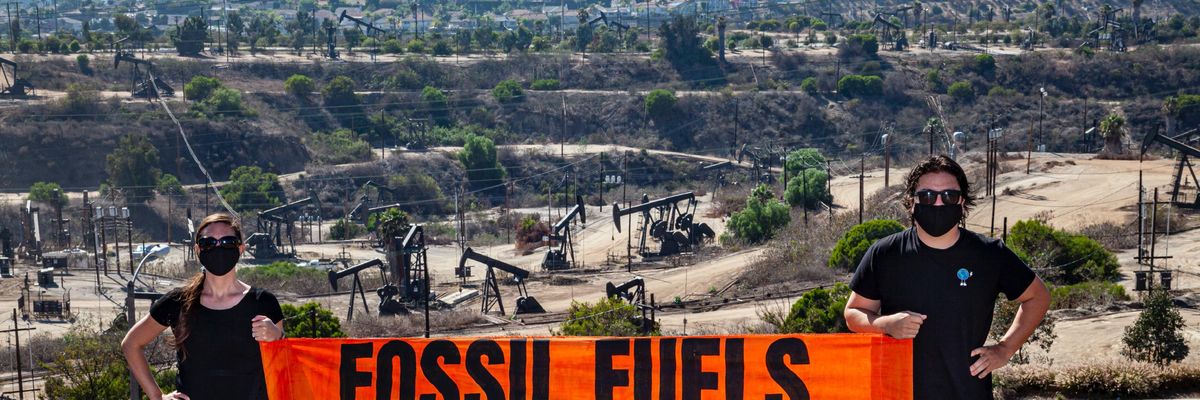Climate and environmental justice campaigners cheered a unanimous vote Wednesday by the Los Angeles City Council to back a ban on all new oil and gas wells, with one group calling the move "the beginning of a new era" of an "equitable transition" toward a fossil-free future for the nation's second-largest city and beyond.
"This is a momentous step forward for Los Angeles, and a clear message we are sending to Big Oil."
The Associated Press reports the council approved a measure directing the city attorney to draft an ordinance that would ban fossil fuel extraction within municipal limits, change zoning laws to outlaw drilling, and study ways to phase out the more than 5,200 existing oil and gas wells--some hidden in plain sight--located throughout the nation's largest urban oilfield.
"This is a momentous step forward for Los Angeles, and a clear message we are sending to Big Oil,'' Council Member Mitch O'Farrell, a Democrat who chairs the body's Energy, Climate Change, Environmental Justice, and River committee, told City News Service.
Speaking at a press conference before Wednesday's vote, O'Farrell called the council's action "a model for the nation and the world."
Council President Nury Martinez--a Democrat who grew up in the city's polluted neighborhoods and introduced the measure with colleague Paul Krekorian--said at the press conference that "for far too long, neighborhood oil drilling has disproportionately affected the health of our low-income communities of color. From freeways to power plants, our frontline communities bear the brunt of pollution and climate impacts."
Ashley Hernandez--a youth organizer with STAND-L.A. and a resident of the Wilmington neighborhood--said outside City Hall following the vote, "I've lived in the frontlines of neighborhood oil drilling my entire life and can't begin to express what I'm feeling inside being here in this moment after all of the years of work frontline residents, partners and allies have fought for."
Hernandez, who hailed "the courage and resistance of Black and Brown communities rising up against oil extraction that does not belong in our neighborhoods," recounted how, while growing up, she experienced nosebleeds and eye infections and witnessed her teachers sickened by oil drilling in Wilmington.
"Days like today remind us that every single petition, every single voice, every single action, and every single person that's come from the frontlines of neighborhood oil drilling has mattered enough," said Hernandez.
Council Member Joe Buscaino, a Democrat who represents Hernandez's district--which is home to more than half of the active fossil fuel sites citywide--said that "to say that the issue before us hits close to home for my district would be a serious understatement."
According to The Guardian:
Thousands of residents live in close proximity to wells but the toxic effects are not evenly distributed, with less affluent Angelenos and people of color bearing the brunt of their environmental impact. A slew of studies have shown the toll drilling can have on public health, including higher rates of asthma and cardiovascular disease and increased risks of babies with low birth weights and other reproductive health issues.
In a paper published last year, researchers from the University of Southern California (USC) noted that South L.A. residents--predominantly Black and Latino families--who live near active oil development have lower lung function. Deficient lung capacity "may contribute to environmental health disparities," the researchers said, likening the health effects to daily exposure to secondhand tobacco smoke.
Adjacent and nearby areas, including Culver City and unincorporated parts of Los Angeles County, have moved to shut down fossil fuel extraction in recent years.
Local fossil fuel phaseouts are part of a statewide movement in California aimed at combating the climate emergency and improving public health. Last October, California fossil fuel regulators proposed a ban on new oil and gas wells within 3,200 feet of schools, homes, and hospitals.
"Starting today, I have a little bit more hope for our communities," said Hernandez. "Our futures will hopefully not be full of emergency room visits, bloody noses, or burdensome health impacts, but a cleaner future where Blackrown families are the ones protected and valued."




